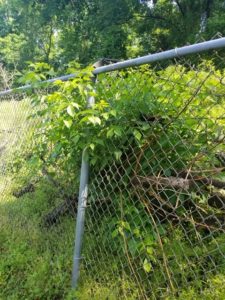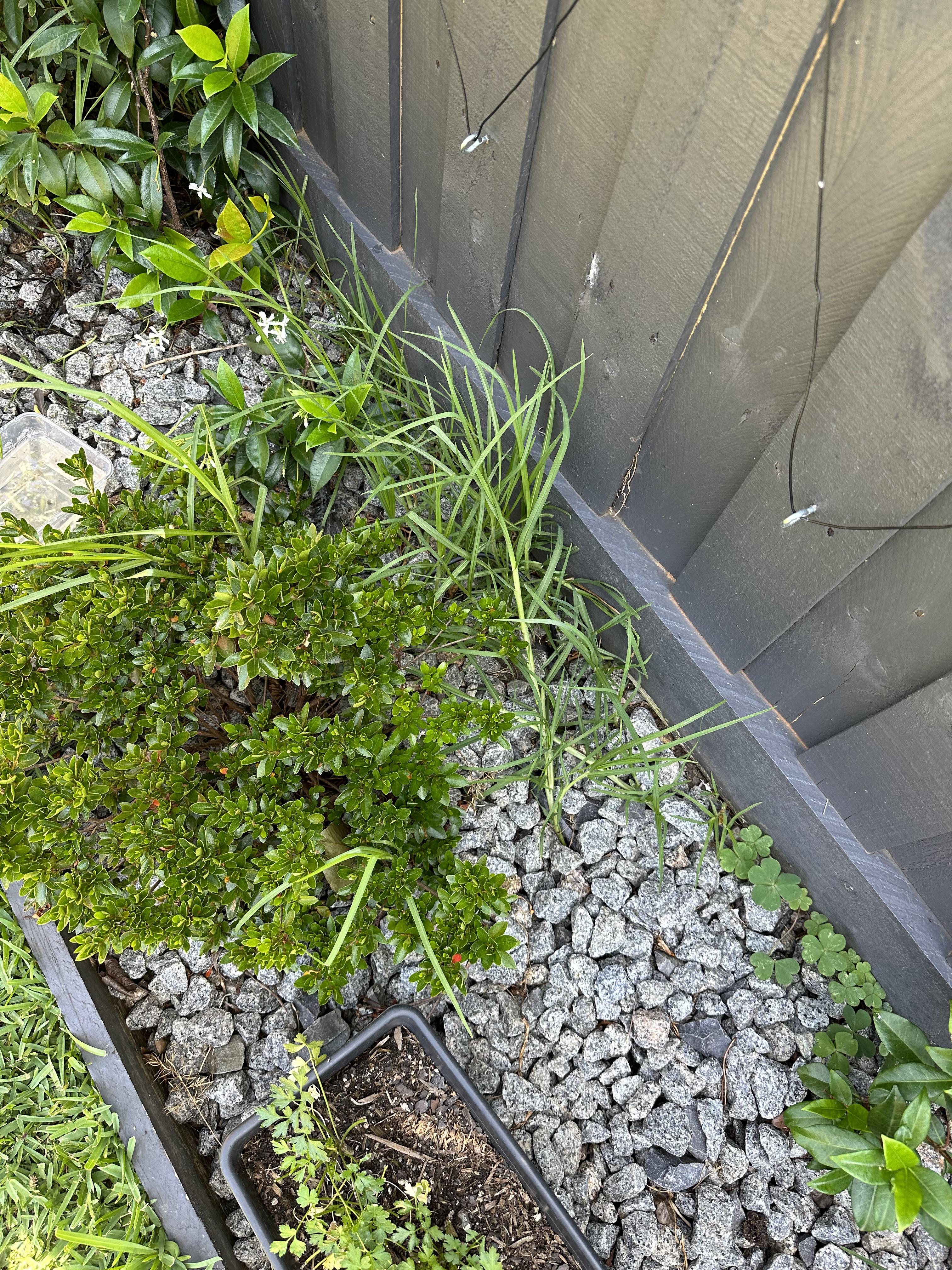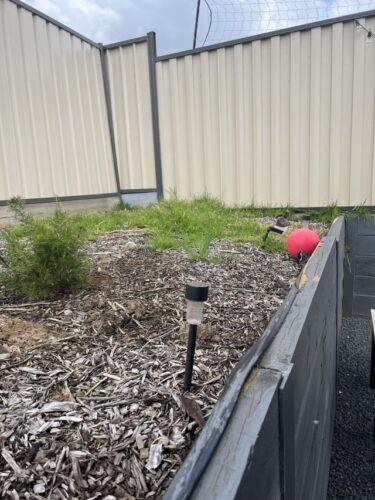To stop plants growing through fence, installing a barrier underground can prevent roots from spreading. Unwanted greenery growing through your fence can be a hassle to deal with.
It not only affects the appearance of your fence but can also cause damage over time. Fortunately, there are several effective methods to prevent plants from encroaching on your fence. From installing physical barriers to utilizing chemical treatments, there are various approaches you can take to maintain the integrity and aesthetic appeal of your fence.
Understanding the nature of the plants and implementing the appropriate prevention method can help you keep your fence clean and well-maintained. We will explore some practical solutions to stop plants from growing through your fence.

Credit: www.greengianthc.com
Identifying The Problem
Having plants grow through your fence can be frustrating, but there are solutions. Learn how to stop plants from infiltrating your fence with these effective methods.
Prevention Techniques
Stopping plants from growing through fences can be a challenge, but there are several prevention techniques you can use to avoid this issue. These methods include creating a physical barrier, applying chemical solutions, and maintaining regular fence maintenance. Proper implementation of these techniques can help you address and prevent plants from encroaching on your fence.
Creating A Physical Barrier
One effective way to prevent plants from growing through your fence is to install a physical barrier. This can be achieved by burying a barrier material like metal flashing or fiberglass mesh along the perimeter of the fence. Make sure the barrier extends below the soil surface to deter root growth. Additionally, using concrete footings for your fence posts can provide an extra layer of protection against plant intrusion.
Applying Chemical Solutions
Another preventative measure is to apply chemical solutions that discourage plant growth. Herbicides or pre-emergent weed control products can be used to inhibit the growth of plants near the fence line. When using chemical solutions, always follow the manufacturer’s instructions and take necessary precautions to prevent any adverse effects on the environment. Be mindful of neighboring plants and follow safe application practices.
Natural Remedies
When it comes to addressing the issue of plants growing through fence, natural remedies can be an effective and eco-friendly solution. Here are some methods to help you prevent plants from encroaching on your fence and ensure your garden stays neat and well-maintained.
Trimming And Pruning
Regular trimming and pruning of plants near the fence can effectively prevent them from growing through. By trimming back branches and foliage that get too close to the fence, you can restrict the growth and prevent them from entwining within the fence structure.
Using Vinegar Solution
Applying a vinegar solution along the perimeter of the fence can act as a natural deterrent to plant growth. The acidity of vinegar can discourage plants from encroaching on the fence, making it a cost-effective and environmentally friendly solution.
Regular Maintenance
Regular Maintenance: Consistent upkeep is key to preventing plants from growing through your fence.
Regular Inspections
Regularly examine the fence line to identify any gaps or damage that may allow plants to penetrate.
Weed Control
Keep the area around the fence free of weeds to prevent them from entwining and growing through.
Long-term Solutions
If you’ve tried the quick fixes to prevent plants from growing through your fence but find yourself dealing with the same issue over and over again, it’s time to consider long-term solutions. These solutions aim to target the root cause of the problem, providing a lasting fix that will keep your fence free from plant intrusions. In this article, we’ll explore two effective long-term strategies: installing a root barrier and replacing or repairing the fence.
Installing A Root Barrier
When plants repeatedly infiltrate your fence, it’s often due to their extensive root systems. These resilient roots can easily find their way through gaps in the fence or grow under the fence and emerge on the other side. Installing a root barrier acts as a physical barrier that prevents the roots from reaching your fence and causing damage.
A root barrier is usually made of a heavy-duty material like plastic or metal and is installed below the ground along the fence line. It creates a continuous barrier that forces the plant roots to grow deeper or divert their course, away from your fence. Here’s how you can install a root barrier:
- Start by digging a trench along the fence line, ensuring it is deep enough to accommodate the root barrier. The depth will depend on the specific plant species in your area.
- Place the root barrier material in the trench, making sure it extends above the soil level. This ensures that even if the roots manage to grow towards the barrier, they will encounter it and be redirected.
- Backfill the trench with soil, compacting it firmly to secure the root barrier in place.
Replacing Or Repairing The Fence
If your fence is old, damaged, or has significant gaps, replacing or repairing it can be an effective long-term solution. A sturdy fence with minimal gaps reduces the likelihood of plants finding their way through. Here are some steps to consider:
- Inspect your fence thoroughly, identifying any areas that are damaged, rotted, or have large gaps.
- If the fence is beyond repair, you may need to replace it entirely. Choose a fence material that is resistant to plant encroachment, such as vinyl or metal.
- If repairing the fence, start by removing any damaged sections and replacing them with new materials.
- Ensure that the fence is properly aligned and secured to prevent future gaps or weak spots.
- Consider adding a layer of mesh or wire along the bottom section of the fence to make it even more challenging for plants to penetrate.
Keep in mind that both installing a root barrier and replacing or repairing the fence require time and effort, but they provide lasting solutions to the problem of plants growing through your fence. Choose the option that best suits your needs and enjoy a plant-free, well-protected fence for years to come.

Credit: www.reddit.com

Credit: www.reddit.com
Frequently Asked Questions For How To Stop Plants Growing Through Fence?
How Do I Keep My Plants From Growing Between My Fences?
Regularly trim and maintain plants to prevent them from growing between your fences. Use weed barriers or herbicides for long-term control.
How Do I Stop My Neighbours Weeds From Coming Through My Fence?
To prevent your neighbor’s weeds from coming through your fence, create a barrier by installing a root barrier or edging along the fence. Regularly maintain your side of the fence by pulling out any weeds that appear. Communicate with your neighbor about jointly tackling the issue.
How Do I Keep Vines From Growing On My Fence?
To prevent vines from growing on your fence, regularly trim them and apply herbicides. Create a barrier by installing a physical blockade or using vine repellents. Monitor the area and remove any new growth promptly to deter further vine encroachment.
What Can I Put Under My Fence To Keep Grass From Growing?
You can put a barrier like plastic edging, metal landscape edging, or mulch under your fence to prevent grass from growing.
Conclusion
Prevent plant growth through fences by using barriers such as landscape fabric or root barriers. Regular maintenance can also help control overgrowth. Implementing these strategies can save time and effort in the long run while keeping your garden looking neat and tidy.
Remember, a little prevention goes a long way!
